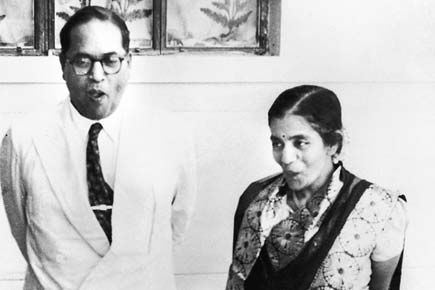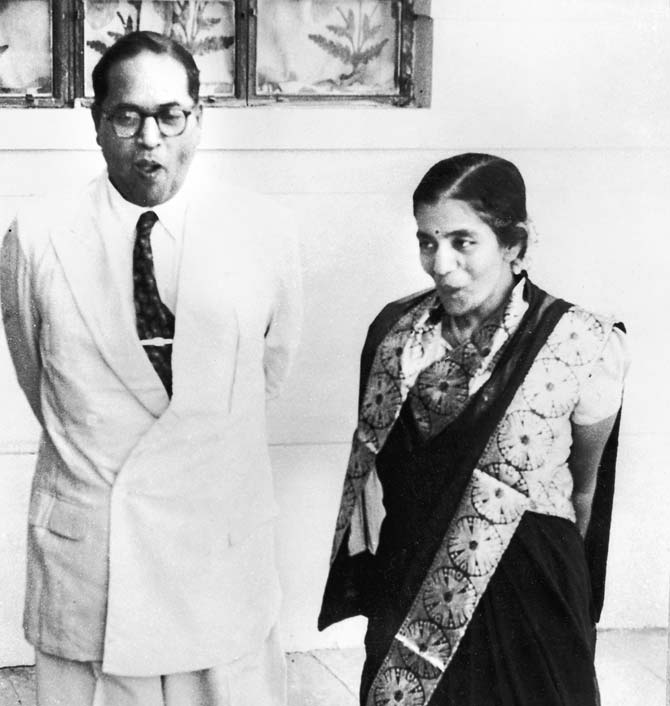It is in many ways tragic, though hardly surprising, to see that many upper castes and wannabe upper castes in India have shed their disdain for the lower castes of the Hindu hierarchical system

 It is in many ways tragic, though hardly surprising, to see that many upper castes and wannabe upper castes in India have shed their disdain for the lower castes of the Hindu hierarchical system. The current fight between the Union Human Resources Ministry which looks after education, IIT-Madras and the students of the Ambedkar-Periyar Study Circle is a case in point.
It is in many ways tragic, though hardly surprising, to see that many upper castes and wannabe upper castes in India have shed their disdain for the lower castes of the Hindu hierarchical system. The current fight between the Union Human Resources Ministry which looks after education, IIT-Madras and the students of the Ambedkar-Periyar Study Circle is a case in point.
ADVERTISEMENT

Dr Babasaheb Ambedkar, seen here with Dr Sharada Kabir, his wife, wrote, ‘Caste is the monster that crosses your path. You cannot have political reform, you cannot have economic reform, unless you kill this monster...’ Pic/Getty Images
Many people claim to be great admirers of Dr BR Ambedkar. But they allude (if at all) to the Constitution of India and stop there. It might occur to any of them with a little bit of thinking that the reason that the Constitution sets a high standard for justice and fair play is because of the views which Ambedkar held. He was scathing about Hinduism and upper caste tyranny and he tore into every argument that justifies injustice. Unlike MK Gandhi, he did not idealise Indian village life and Indian religious life. The warts he saw in both were warts which had plagued his own life and the barbs and injustices he himself suffered.
This is from Ambedkar’s “Annihilation of Caste”: “...turn in any direction you like, Caste is the monster that crosses your path. You cannot have political reform, you cannot have economic reform, unless you kill this monster...
“It is a social system which embodies the arrogance and selfishness of a perverse section of the Hindus who were superior enough in social status to set it in fashion, and who had the authority to force it on their inferiors.”
Social reform in India has been a long and tortuous journey. Consider that caste discrimination has been banned since the Constitution was accepted in 1950. But caste prejudice has not yet vanished. It remains in small, insidious, destructive ways and sometimes in large, violent ways. Its reach extends beyond Hindus and many converts to Islam, Christianity and Sikhism practise caste-based bias.
Since the Mandal Commission protests however, to be anti-Dalit has become fashionable for some, using the umbrella of reservations to hide their hateful racism. It may be true that reservations have not been as effective as they should have, that students in the “general” category feel they have no wiggle room, that not all Dalits and Other Backward Castes need job or educational reservations or that all Brahmins are rich and therefore need no help. But, at the risk of upsetting everyone especially the small-minded and the ungenerous, is there any easy way of wiping out thousands of years of institutionalised, humiliating, degrading and disgusting inhumane cruelty?
It is very easy to portray the fight between the Ambedkar-Periyar Study Circle and the management of the institute into one of technical propriety. But it is not easy to ignore just who is being targeted here: students who are asking difficult questions of our society using the writings of those who asked Hinduism some of its toughest questions. The issue also underlines what is now an easily visible trend in the new India: to cast everyone in opposing lights of good/bad, black/white, upper/lower and so on. It is as if we have lost the ability to grasp that life is not necessarily either this or that. It can be many things, some confusing, all at once.
It is worth making the effort to read Ambedkar’s writings, to understand how his sharp mind worked and the excoriating arguments he made against both caste and Hinduism. Luckily, after years of being ignored by Mumbai University which held its publishing rights, Riddles in Hinduism is available online. It is a careful and erudite takedown of the religion which rejected Ambedkar and dismissed him and the majority of Indians to live a life of slavery, the target of bigotry and hatred.
Ambedkar died a Buddhist but he fought to the end for a secular, liberal India. Politicians of all hues are getting ready to compete to celebrate Ambedkar’s 125th birth anniversary. If they understand only half of what he stood for and fought for however, India by now would have become a far, far better nation.
Ranjona Banerji is a senior journalist. You can follow her on twitter @ranjona
 Subscribe today by clicking the link and stay updated with the latest news!" Click here!
Subscribe today by clicking the link and stay updated with the latest news!" Click here!






